10 Most Important Elements of Local SEO: Nailing 'Near Me' Searches
Feb 18, 2025
Written by Casey Bjorkdahl

Casey Bjorkdahl is one of the pioneering thought leaders in the SEO community. In 2010, Casey co-founded Vazoola after working for a Digital Marketing Agency for five years in New York City. Vazoola is now one of the fastest growing and most widely recognized SEO marketing firms in the country.
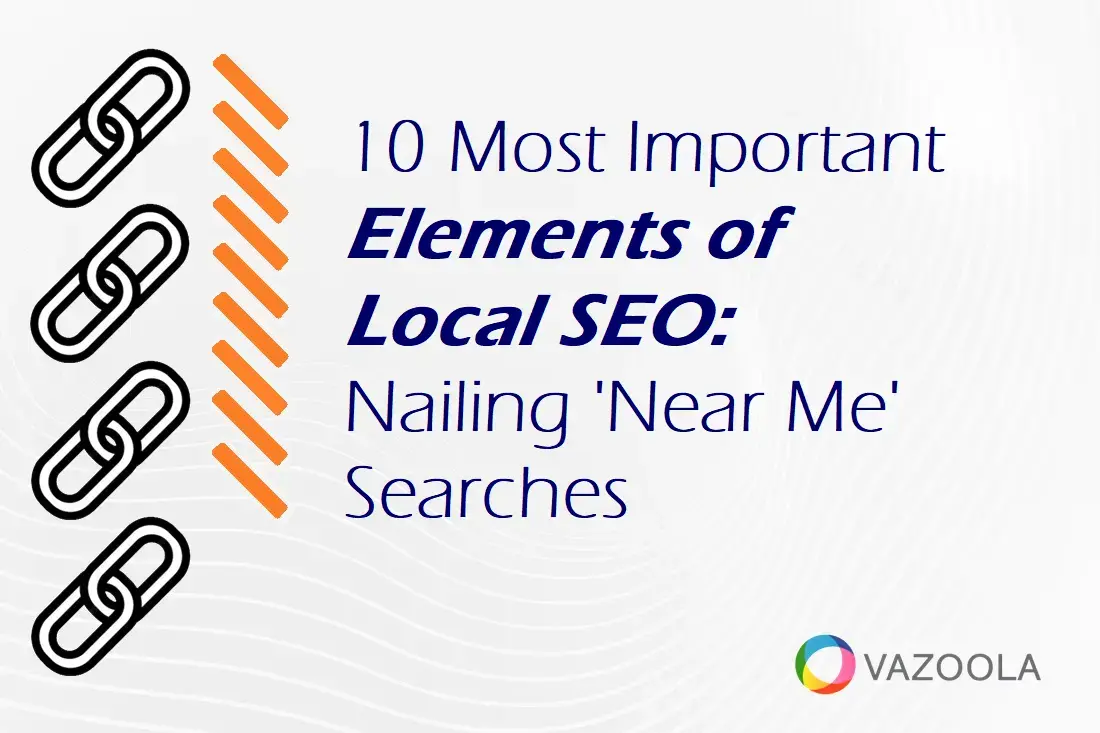
Are you a business that depends on local clientele, and you want to know what it takes to show up in local search results? You can learn local SEO!
Local search engine optimization is essential for any businesses that want to attract customers in their geographic areas. As search behavior continues to evolve, people more and more rely on “near me” searches to find products and services in real time.
It makes no difference if the customer is looking for a restaurant, an auto repair shop, or a law firm, businesses that optimize for local search gain a competitive advantage.
A strong local SEO strategy means optimizing Google Business Profiles, managing online reviews, acquiring local backlinks, and using location-based keywords. There are at least 10 of the most important elements of local SEO to improve rankings in local search results.
Key Takeaways:
-
Local SEO lets businesses increase visibility in geographic search results.
-
To rank in “near me” searches requires optimization of Google Business Profiles, local citations, and location-based keywords.
-
Online reviews, local backlinks, and social media are crucial in boosting local search results rankings.
-
Businesses that don't have a physical storefront can still benefit from local SEO optimization strategies.
Table of Contents:
What Is Local SEO?
What is local SEO optimization? What is the definition of local SEO, and how does local SEO work?
Local SEO enables a business to optimize its presence online to appear to local customers through search engines. It's a must for any business – both brick-and-mortar stores or service-based companies – operating with local traffic to show up in relevant search results.
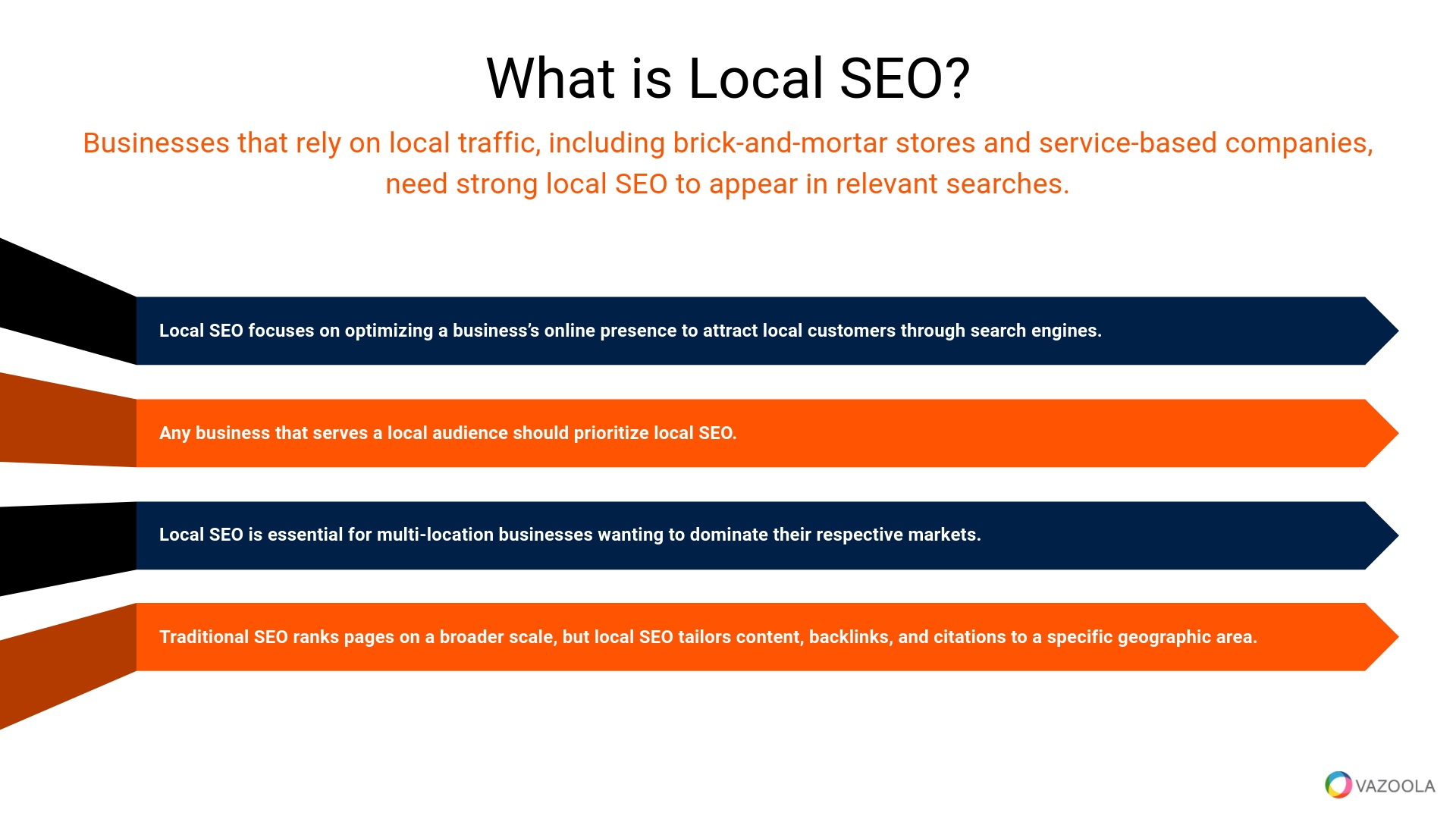
Who needs local SEO?
Local SEO is important to any business serving a local audience. Restaurants, law firms, healthcare providers, and even online service providers who focus on particular regions can all benefit from this. SEO for local businesses is also vital for multi-location businesses that seek to dominate the markets in their respective areas.
What is the difference between SEO and local SEO?
You probably know that traditional SEO focuses on ranking web pages on a broader scale. But SEO for local business is different. It deals with local ranking, and it tailors content, backlinks, and citations to a specific geographic area. Google’s local search algorithm prioritizes businesses based on factors like proximity, relevance, and prominence.
Why is local SEO important? You can see an in-depth comparison between regular SEO and local SEO in “Is SEO Dead,” which takes a deep dive into why SEO remains so crucial for today’s businesses.
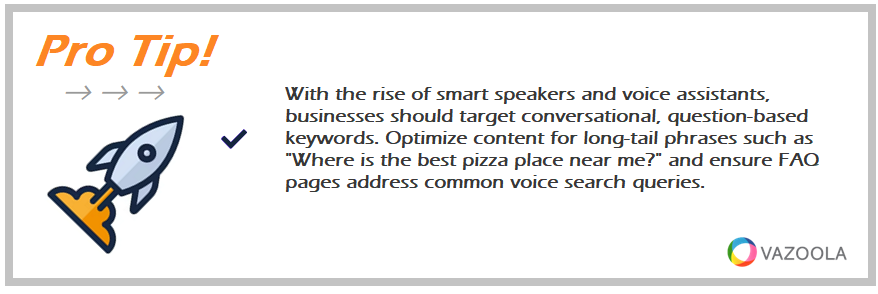
With the rise of smart speakers and voice assistants, businesses should target conversational, question-based keywords. Optimize content for long-tail phrases such as "Where is the best pizza place near me?" and ensure FAQ pages address common voice search queries.
10 Important Elements of Local SEO
What should an effective local SEO strategy include? The following 10 local SEO tactics are crucial for boosting local SEO rankings.
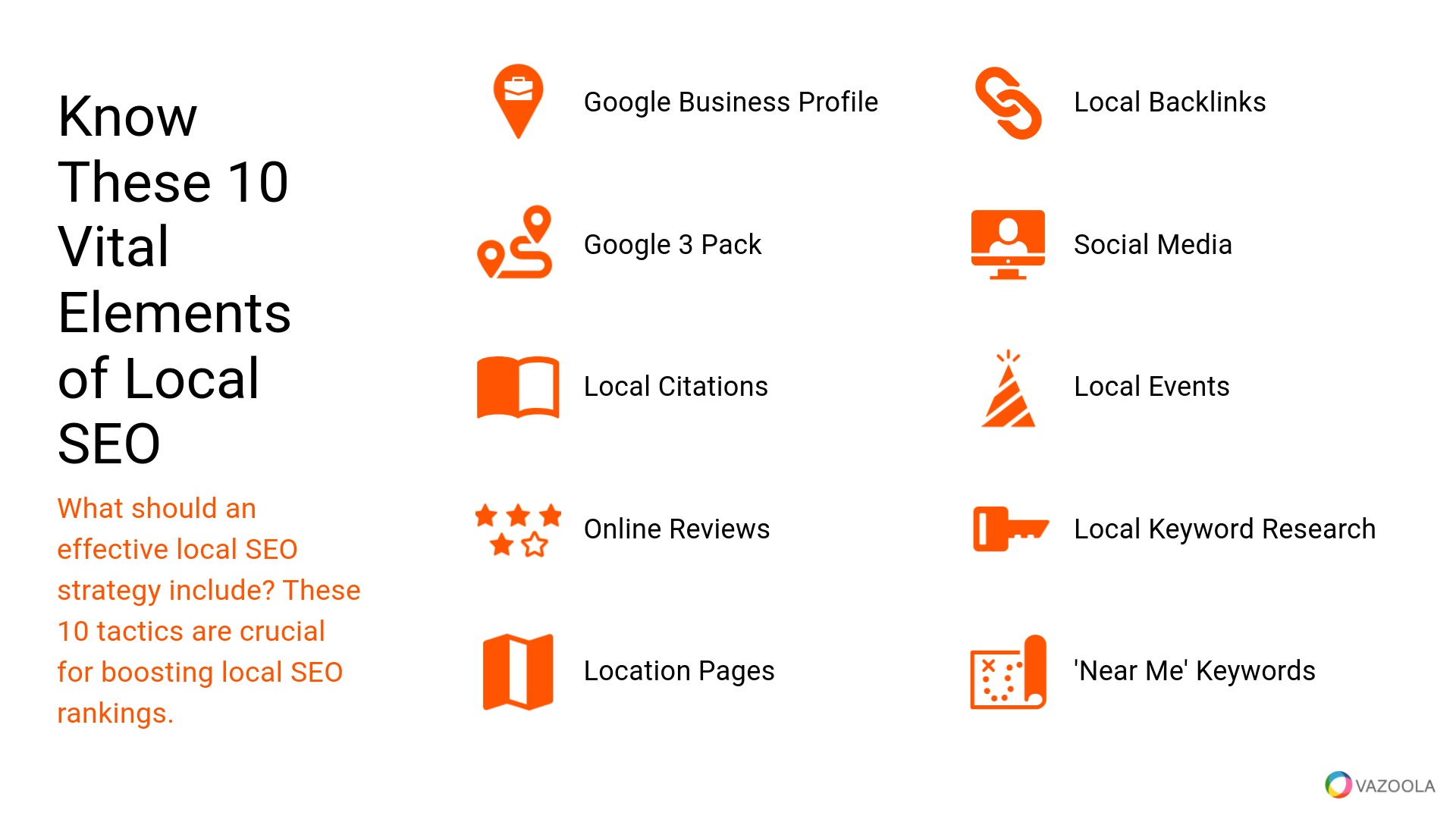
1. Google Business Profile
A Google Business Profile is a business’s digital storefront in search results. Keeping business hours, categories, and services updated helps visibility. Posting updates, responding to reviews, and adding images on a regular basis all improve engagement. Businesses can manage their profiles through the Google Business Profile dashboard.
2. Google 3 Pack
The Google 3-Pack highlights the top three local businesses for a search query. Factors influencing placement include GBP optimization, reviews, and proximity to the searcher. Including location-based keywords and encouraging customer engagement boosts visibility in this coveted spot.
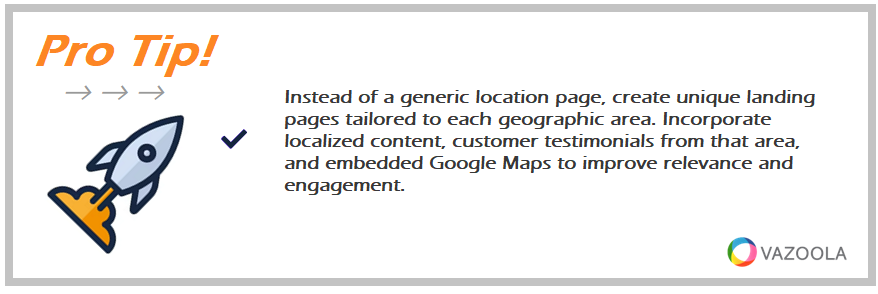
Instead of a generic location page, create unique landing pages tailored to each geographic area. Incorporate localized content, customer testimonials from that area, and embedded Google Maps to improve relevance and engagement.
3. Local Citations
Local citations—mentions of a business’s name, address, and phone number (NAP)—validate its legitimacy. Listing a business on high-quality directories such as Yelp, Yellow Pages, and the Better Business Bureau improves local rankings. Local citation building and a well-managed citation profile ensures NAP consistency across platforms.
4. Online Reviews
Reviews play a critical role in local SEO. Businesses with high ratings tend to rank higher in local search results. Encouraging satisfied customers to leave reviews on Google and other platforms enhances trust and authority. To maximize benefits:
-
Respond to all reviews promptly.
-
Request reviews from happy customers.
-
Address negative feedback professionally.
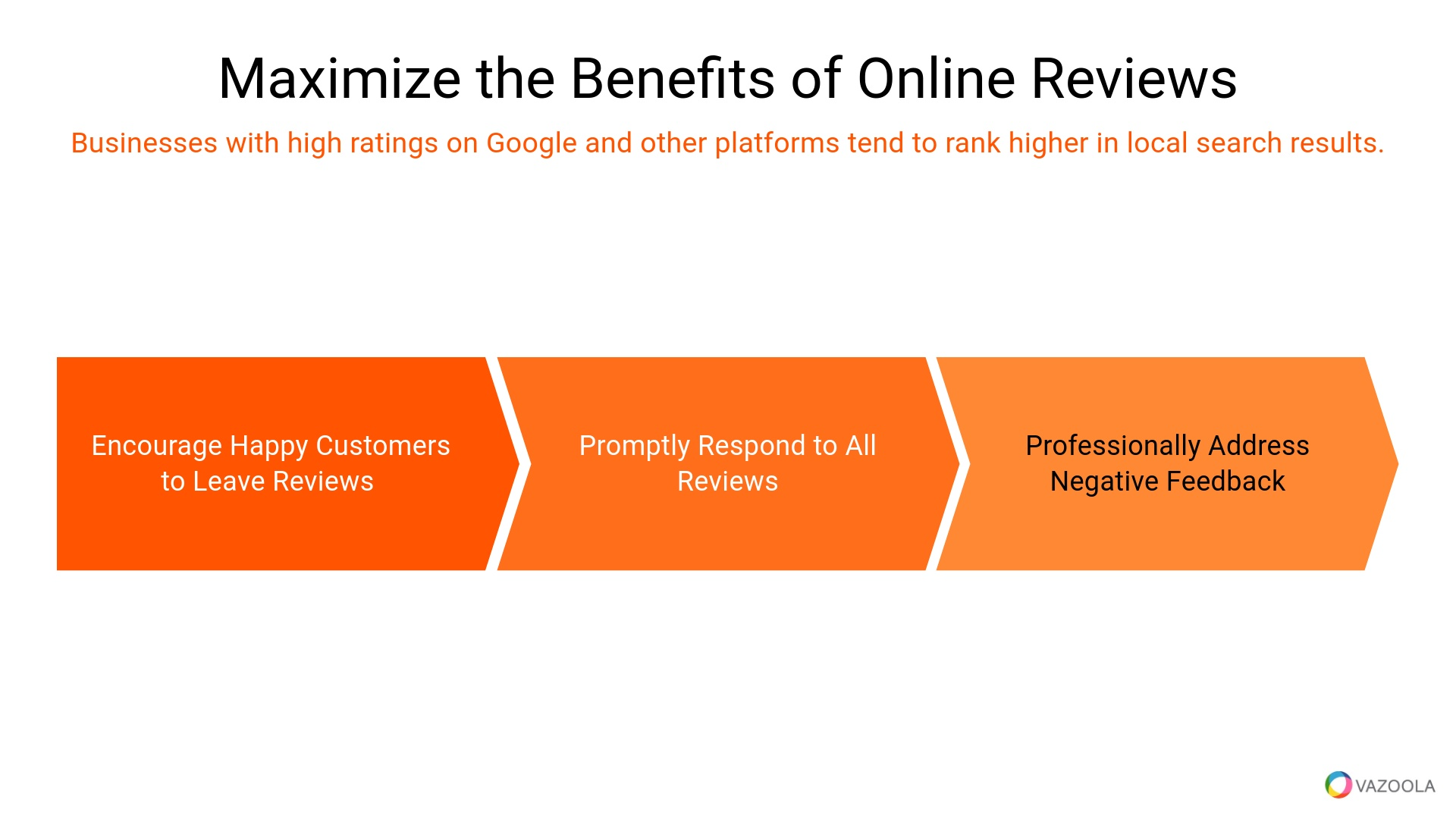
5. Location Pages
For businesses with multiple locations, creating dedicated pages with localized content improves local rankings. Location pages should include address and contact details, unique descriptions of services offered in each area, and embedded Google Maps for easy navigation
6. Local Backlinks
Local backlinks signal to search engines that a business is relevant within a community. Earning links from chambers of commerce, local newspapers, and industry directories strengthens credibility.
A strong backlink profile includes links from authoritative local sources, and it lists partnerships with community organizations, as well as any sponsorships for local events
For more insights into backlinks, refer to Vazoola’s local link-building guide for more on a local SEO guide.
7. Social Media
While social media does not directly impact rankings, a consistent and active presence strengthens brand authority. Businesses should:
-
Ensure profile details match their website (consistent NAP).
-
Share location-specific content.
-
Engage with customers through comments and direct messages.
-
Promote products, services, and events.
-
Partner with other local organizations for a joint local SEO campaign.
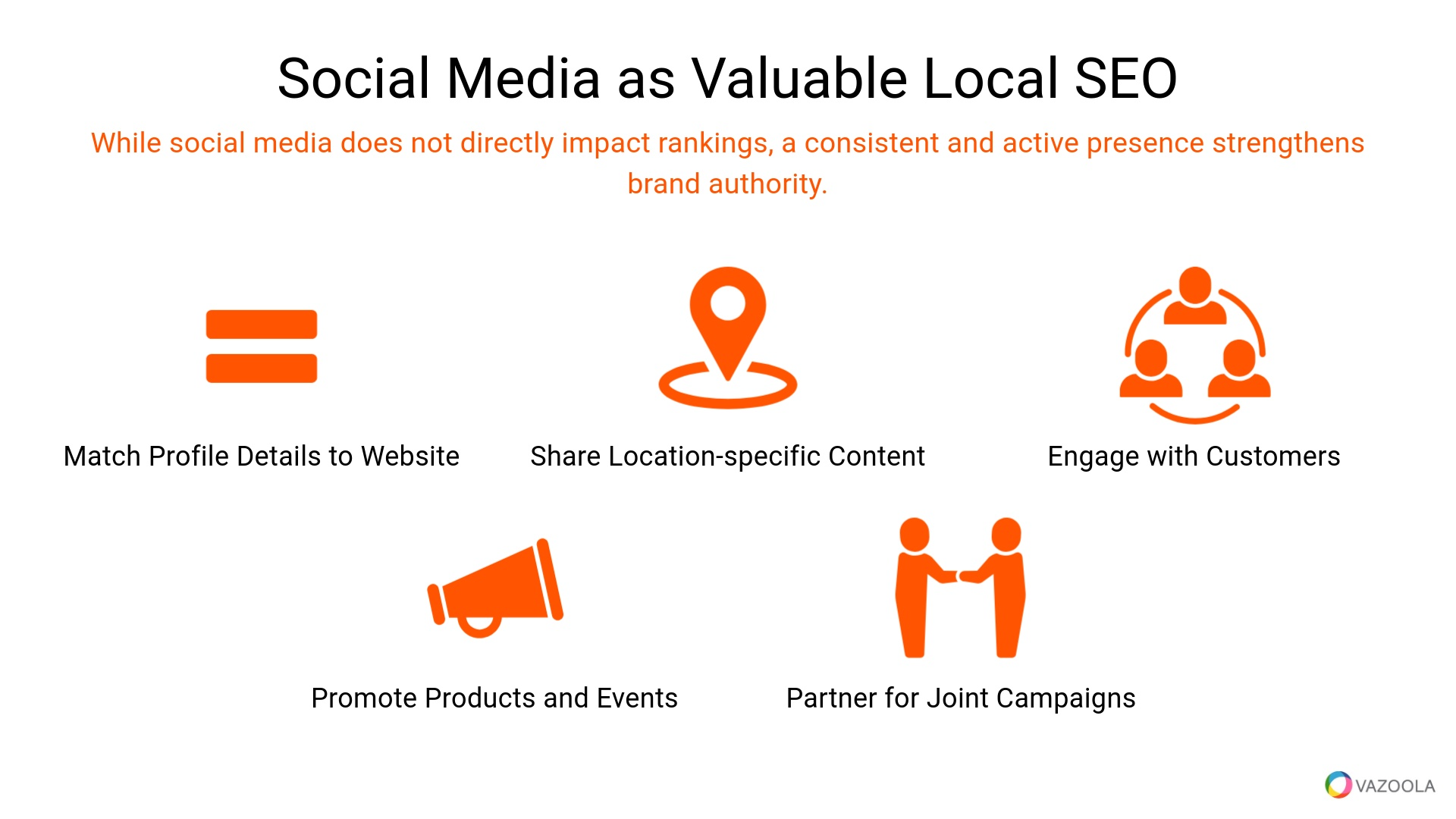
8. Local Events, Community Activities
Hosting or sponsoring local events builds brand recognition and earns local press mentions, which can improve search visibility. Some local SEO strategies include:
-
Collaborating with local organizations.
-
Participating in community fundraisers.
-
Sponsoring community events or awards.
-
Participating in community festivals and other events.
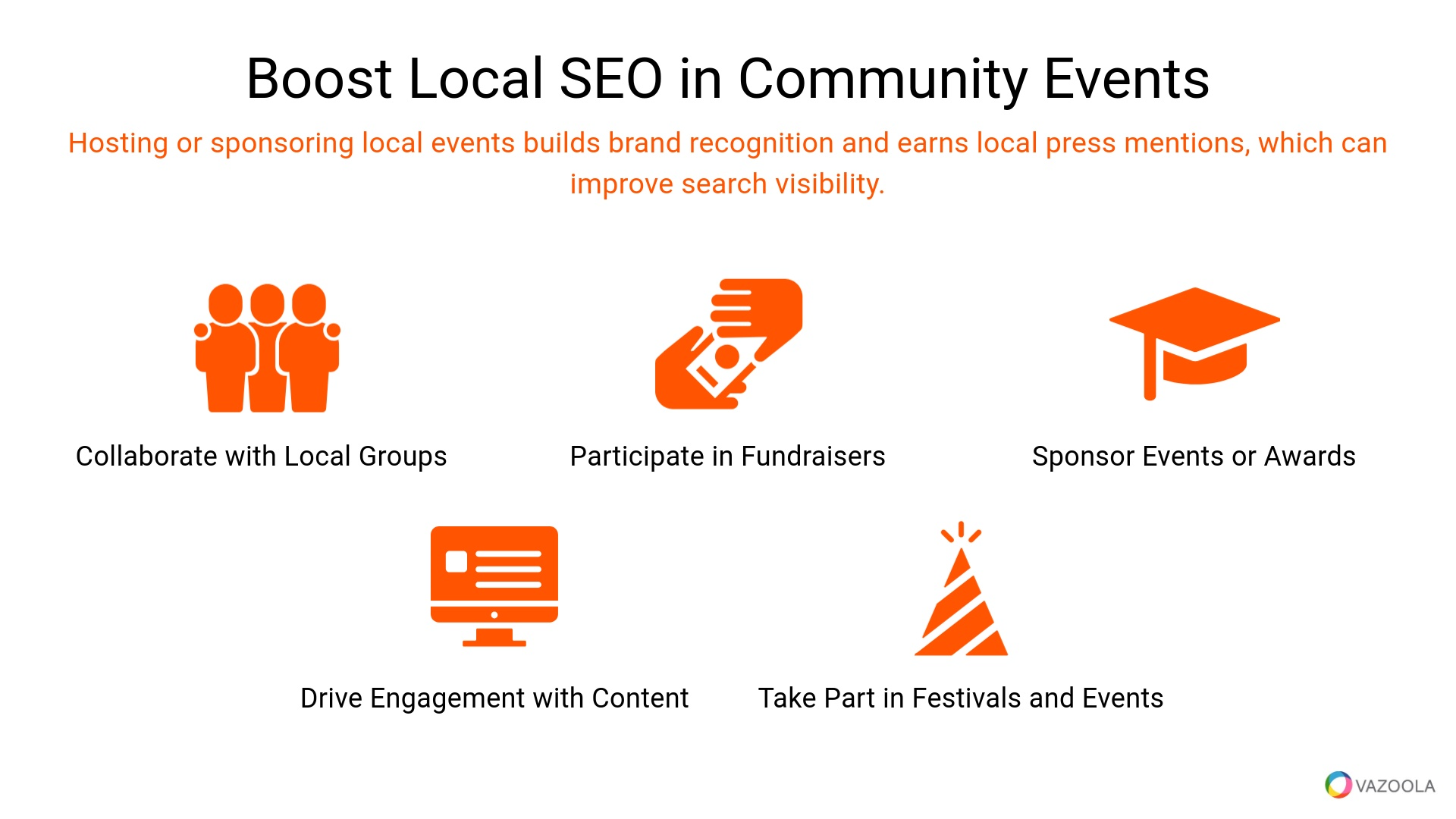
9. Keyword Research for Local SEO
Optimizing for local search SEO requires researching relevant keywords that match local search intent. For local SEO examples, instead of targeting “plumber,” businesses should optimize for “emergency plumber in [city].” Some best practices include:
-
Using Google’s Keyword Planner for location-specific terms
-
Reviewing competitor keyword strategies
-
Integrating long-tail local SEO keywords into service pages
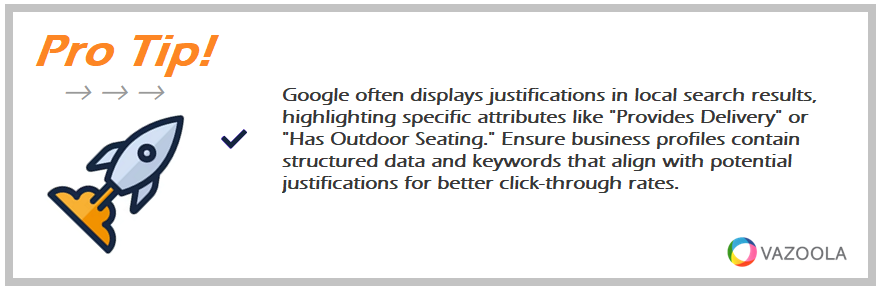
Google often displays justifications in local search results, highlighting specific attributes like "Provides Delivery" or "Has Outdoor Seating." Ensure business profiles contain structured data and keywords that align with potential justifications for better click-through rates.
10. 'Near Me' Keywords
Do you know how to rank for “near me” keywords? Can you optimize “near me?”
Searches containing “near me” have surged in recent years. Businesses can rank for these terms by ensuring NAP consistency across directories, optimizing meta descriptions with local intent phrases, and creating location-specific content. Now you know how to optimize for “near me” SEO searches.
Best Tools for SEO Local and Local SEO Tips
There are tips for local SEO.
Optimizing for local SEO requires the right tools to track performance, identify opportunities, and maintain an effective local search strategy.
From analyzing search rankings to managing business local listings SEO, these tools help businesses stay competitive in local search results.
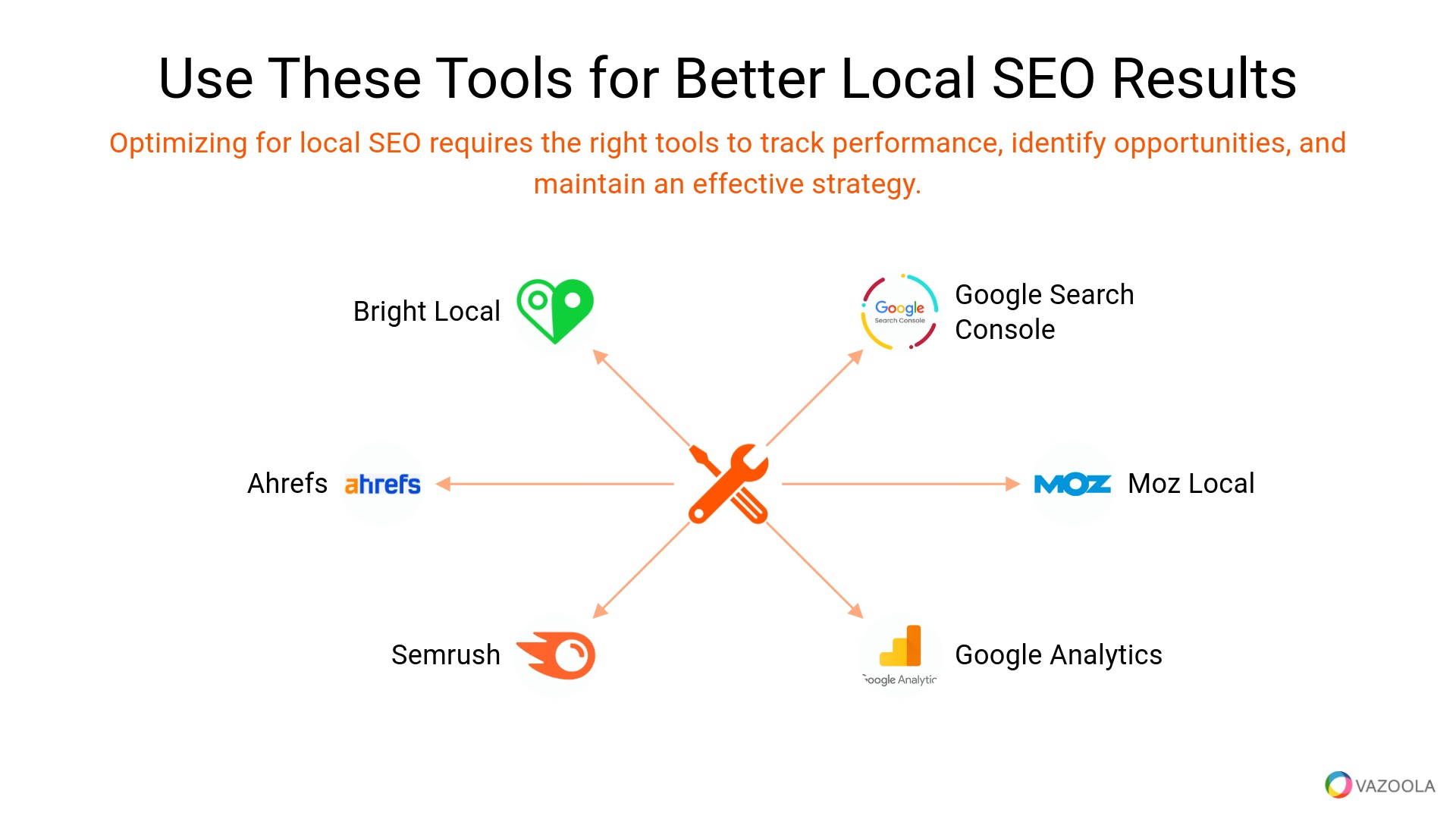
Below are some of the best tools for local SEO, categorized by their primary function.
Local SEO Analysis Tools
Google Search Console provides insights into how a website performs in search results. It helps businesses identify indexing issues, monitor keyword rankings, and track site traffic from each local SEO search.
Moz Local is another valuable tool that ensures business information remains consistent across directories. It scans for incomplete or duplicate local SEO listings and suggests improvements to strengthen local SEO marketing efforts.
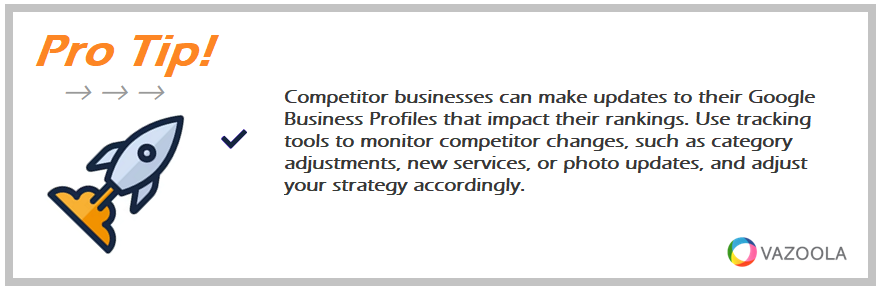
Competitor businesses can make updates to their Google Business Profiles that impact their rankings. Use tracking tools to monitor competitor changes, such as category adjustments, new services, or photo updates, and adjust your strategy accordingly.
Tools for Improving Local SEO
Semrush offers robust competitor analysis and keyword tracking features tailored for local search optimization. Businesses can use it to discover location-based keywords, analyze backlink profiles, and optimize content for a higher local SEO ranking.
BrightLocal specializes in monitoring local search visibility and online reputation. It provides an all-in-one dashboard to track local rankings, manage customer reviews, and audit citation accuracy.
Tools for Monitoring Local Search Results
Google Analytics remains one of the most effective tools for understanding local website traffic and customer behavior. Businesses can use it to track how users interact with their site, which pages generate the most engagement, and which search queries drive local traffic.
Ahrefs is another essential tool, offering insights into local backlink profiles and keyword performance. By analyzing competitors' local business SEO strategies, businesses can refine their approach and improve their rankings in geographic searches.
With the right tools, businesses can optimize their local SEO strategy, track their progress, and stay ahead of competitors in each local search result.
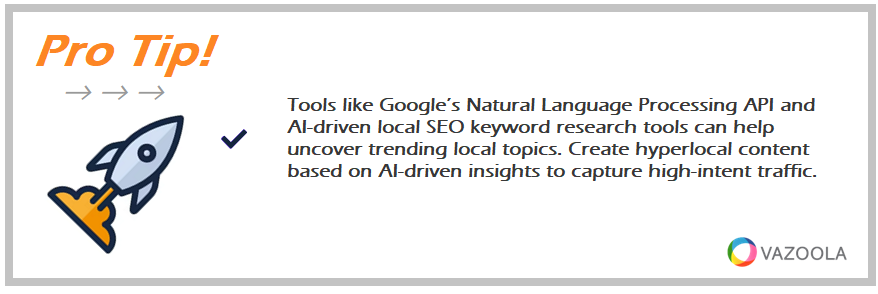
Tools like Google’s Natural Language Processing API and AI-driven local SEO keyword research tools can help uncover trending local topics. Create hyperlocal content based on AI-driven insights to capture high-intent traffic.
The Best Local SEO Strengthens Local Presence
SEO for local businesses can be a strong strategy for any business that seeks to attract local customers and elevate its search visibility. Optimizing Google Business Profiles, managing local citations, gaining quality backlinks, and leveraging customer reviews all help businesses grow stronger in the local search results.
Invest in the right SEO tools for continued success, tracking performance and finding areas for improvement. Whether you're a physical store or location-based service, follow these local SEO best practices to help you compete effectively and communicate with your target audience.
There you have the local SEO basics. Get ready to optimize!
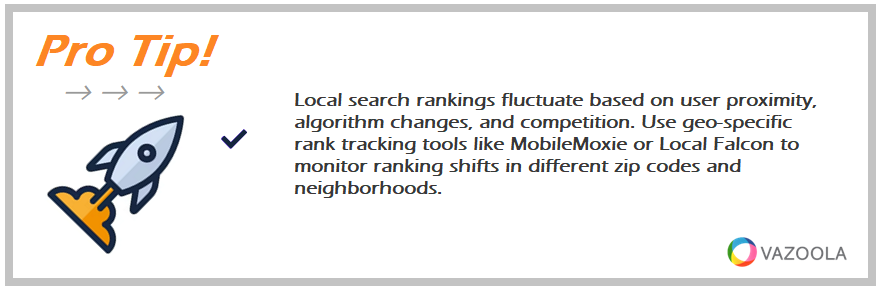
Local search rankings fluctuate based on user proximity, algorithm changes, and competition. Use geo-specific rank tracking tools like MobileMoxie or Local Falcon to monitor ranking shifts in different zip codes and neighborhoods.

